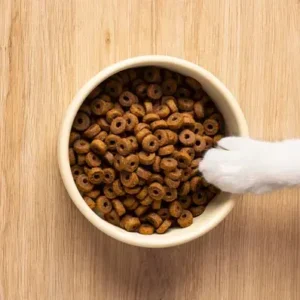Nutritional Benefits of Cheese for Dogs
Cheese isn’t just a tasty treat—it also offers several health benefits for your dog when served appropriately:
- Protein: Cheese is an excellent source of protein, which helps build and repair muscles, especially for active dogs.
- Calcium: This essential nutrient supports healthy bones and teeth, aiding in your dog’s overall skeletal health.
- Vitamins and Minerals: Cheese contains valuable vitamins like vitamin A (important for vision and immune health) and B-complex vitamins (which boost energy and brain function).
- Great Training Treat: Small pieces of cheese can serve as high-value rewards during training sessions, motivating your dog to learn new commands or tricks.
That said, these benefits come with a caveat: cheese is calorie-dense and should only be offered occasionally.
Risks of Feeding Cheese to Dogs
While cheese can be safe and nutritious in moderation, there are some potential risks you need to consider:
- Lactose Intolerance: Many dogs, especially as they age, lose the ability to digest lactose effectively. This can lead to symptoms such as bloating, gas, diarrhea, or vomiting after consuming cheese. If your dog displays these signs, they might be lactose intolerant, and cheese should be avoided.
- High-Fat Content: Cheeses like cheddar and gouda are high in fat, and overfeeding can contribute to obesity. In severe cases, consuming food with too much fatty acid can trigger pancreatitis, a potentially life-threatening condition.
- Additives and Seasonings: Certain types of cheese, like blue cheese or those containing garlic, onions, or herbs, are toxic to dogs. Even small amounts can pose serious health risks. Always opt for plain, unseasoned cheese varieties.
- Salt Content: Some cheeses are high in sodium, which can be harmful to dogs, especially those with heart or kidney issues. Too much salt can lead to dehydration and other complications.
Signs of Cheese Intolerance or Allergies in Dogs
If you’re introducing cheese to your dog for the first time, watch for these signs of intolerance or allergies:
- Vomiting or diarrhea.
- Excessive gas or bloating.
- Itching, redness, or skin irritation.
If your dog shows any of these symptoms after eating cheese, stop offering it immediately and consult your veterinarian.
Types of Cheese Dogs Can and Cannot Eat
Not all kinds of cheeses are created equal when it comes to feeding them to your dog.
Here’s a quick guide:
- Dog-Friendly Cheeses:
- Mozzarella: A lower-fat option that’s easier on your dog’s stomach.
- Cottage Cheese: Low in fat and lactose, making it a safer choice for dogs with sensitive digestion.
- Plain Cheddar: Generally safe in small amounts, though higher in fat compared to mozzarella.
- Cheeses to Avoid:
- Blue Cheese: Contains roquefortine C, a substance toxic to dogs, especially in large amounts.
- Flavored Cheeses: Garlic, onion, and herb-infused cheeses can be highly toxic and should never be given to dogs.
- High-Fat Cheeses: Cream cheese, brie, and gouda are calorie-dense and can lead to weight gain if overfed.
When offering cheese to your dog, always choose safe, low-fat options in moderation and avoid toxic varieties to keep their health and digestion in check.
How to Safely Feed Cheese to Your Dog
Before introducing cheese into your dog’s diet, it’s always a good idea to consult with your veterinarian. Certain foods may be better or worse for your dog depending on their health, weight, and whether they are lactose intolerant.
If you plan to use cheese as a treat for training or to hide pills, keep the portions small and infrequent. Treats should make up no more than 10% of your dog’s diet, with the remaining 90% coming from balanced dog food. Opt for low-fat, low-sodium, and preferably low-lactose cheeses to ensure a healthier choice for your dog.
The amount of cheese a dog can typically handle depends on their size. Check out the recommended portion sizes for different dog breeds below:
| Dog Size | Weight Range | Recommended Cheese Portion | Breed Examples |
| Extra-small dog | 2-20 pounds | 1-2 pieces (½-inch wide by ¼-inch thick) | Dachshund, Toy Poodle, Maltese, Pekingese |
| Small dog | 21-30 pounds | 2-3 pieces (1 inch wide by ¼-inch thick) | Shih Tzu, French Bulldog, Cocker Spaniel |
| Medium dog | 31-50 pounds | 5-6 pieces (1 inch wide by ¼-inch thick) | Whippet, Standard Schnauzer, English Springer Spaniel |
| Large or extra-large dog | 51+ pounds | 5-6 pieces (1 inch wide by ¼-inch thick) | Boxer, Golden Retrievers, Doberman Pinscher |
Creative Ways to Feed Cheese to Dogs
Cheese can be more than just a snack—here are some creative ways to use it:
- Pill Pocket Alternative: Cheese is soft and pliable, making it a great option for hiding medications your dog might otherwise refuse to take.
- Training Treat: Small pieces of cheese can act as a high-value reward during training sessions, especially for difficult commands.
- Homemade Dog Treats: Add a little cheese to homemade dog biscuits or frozen treats for an extra flavor boost.
Cheese can be a fun and tasty addition to your dog’s diet. It’s perfect for enhancing training, rewarding good behavior, or making homemade treats. Just be sure to use it in moderation to keep your dog healthy and happy.
Safer Alternatives to Cheese for Dogs
If you’re unsure about feeding cheese, consider these dog-friendly fruits and veggies:
- Blueberries: Dogs can eat blueberries as a low-calorie snack packed with antioxidants, which help support their immune system and overall health.
- Carrots: Dogs can eat carrots, and their crunchy texture makes them excellent for promoting dental health while providing essential vitamins like beta-carotene.
- Apples: Dogs can eat apples as a sweet and refreshing treat. Just make sure to remove the seeds and core, as they can be harmful if ingested.
- Watermelon: Dogs can eat watermelon, which is hydrating and full of vitamins like A and C. Be sure to remove the seeds and rind to prevent digestive issues.
- Tomatoes: Dogs can eat ripe tomatoes in small amounts, as they are a safe source of vitamins and antioxidants. However, avoid feeding green or unripe tomatoes, as they contain solanine, a compound toxic to dogs.
These options are safer and provide similar nutritional benefits.








